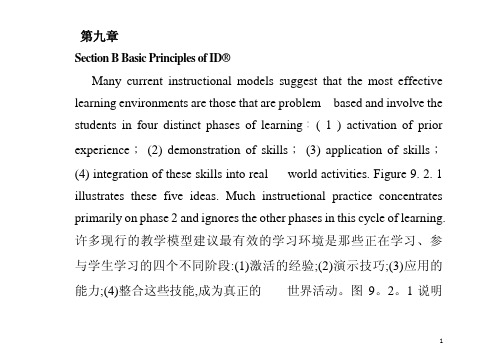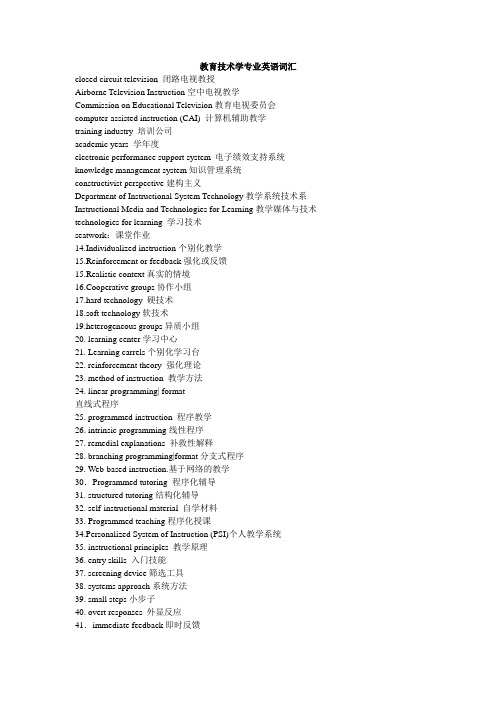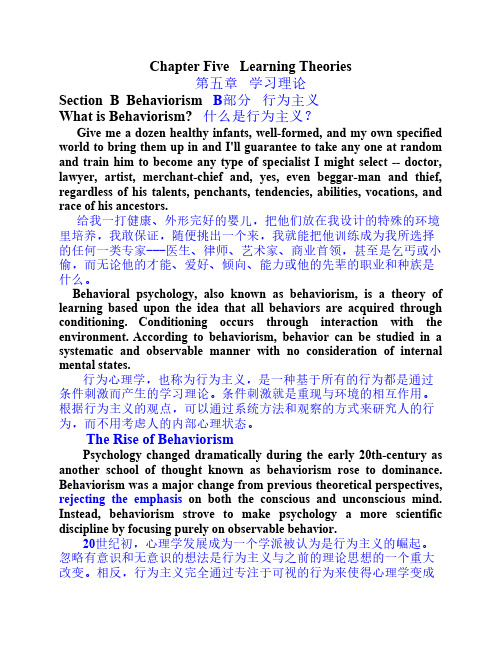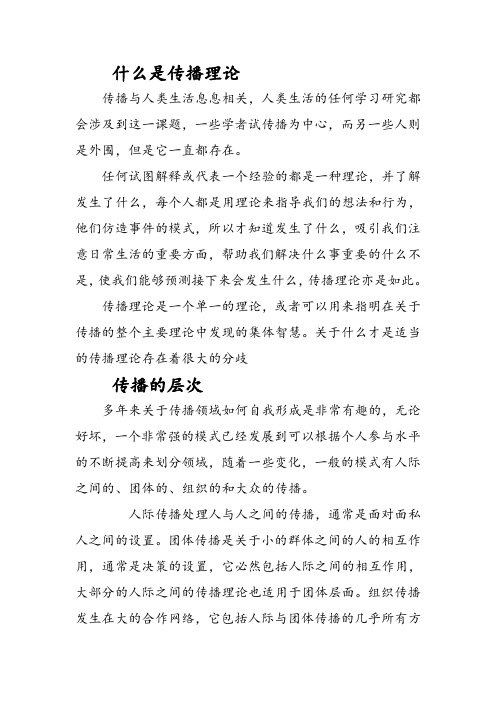教育技术学专业英语PPT课件
教育技术学专业英语第九章翻译

第九章Section B Basic Principles of ID®Many current instructional models suggest that the most effective learning environments are those that are problem—based and involve the students in four distinct phases of learning :(1)activation of prior experience;(2)demonstration of skills;(3)application of skills;(4)integration of these skills into real—world activities.Figure9.2.1 illustrates these five ideas.Much instruetional practice concentrates primarily on phase2and ignores the other phases in this cycle of learning.许多现行的教学模型建议最有效的学习环境是那些正在学习、参与学生学习的四个不同阶段:(1)激活的经验;(2)演示技巧;(3)应用的能力;(4)整合这些技能,成为真正的——世界活动。
图9。
2。
1说明了这些五的想法。
多instruetional实践集中主要在第二阶段,而忽略了其他方面在这个循环的学习。
At the too level.the instructional design prescriptions based on first principles are as follows ::(1〉Learning is facilitated when learners are engaged in solving real-world problems.在太水平。
教育技术专业英语词汇总结

教育技术学专业英语词汇closed circuit television 闭路电视教授Airborne Television Instruction空中电视教学Commission on Educational Television教育电视委员会computer-assisted instruction (CAI) 计算机辅助教学training industry 培训公司academic years 学年度electronic performance support system 电子绩效支持系统knowledge management system知识管理系统constructivist perspective建构主义Department of Instructional System Technology教学系统技术系Instructional Media and Technologies for Learning教学媒体与技术technologies for learning 学习技术seatwork:课堂作业14.Individualized instruction个别化教学15.Reinforcement or feedback强化或反馈15.Realistic context真实的情境16.Cooperative groups协作小组17.hard technology 硬技术18.soft technology软技术19.heterogeneous groups异质小组20. learning center学习中心21. Learning carrels个别化学习台22. reinforcement theory 强化理论23. method of instruction 教学方法24. linear programming| format直线式程序25. programmed instruction 程序教学26. intrinsic programming线性程序27. remedial explanations 补救性解释28. branching programming|format分支式程序29. Web-based instruction.基于网络的教学30.Programmed tutoring 程序化辅导31. structured tutoring结构化辅导32. self-instructional material 自学材料33. Programmed teaching程序化授课34.Personalized System of Instruction (PSI)个人教学系统35. instructional principles 教学原理36. entry skills 入门技能37. screening device筛选工具38. systems approach系统方法39. small steps小步子40. overt responses 外显反应41.immediate feedback即时反馈42. empirical approach 经验主义方法43. formative evaluation形成性评价44.summative evaluation 总结性评价45. instructional design models教学设计模式46. behavioral objectives行为目标47. self-instructional system 个别化教学系统48. cognitive domain 认知领域49. norm-referenced 常模参照测验50.criterion-referenced 标准参照测验51.outcomes-verbal information言语信息52. intellectual skills智力技能53. psychomotor skills动作技能54. cognitive strategies认知策络55. events of instruction教学事件56cognitive psychology 认知心理学57. computer-based instruction基于计算机的教学58. front-end analysis前段分析59.Metacognition元认知60. cognitive awareness认知知觉61. metacognitive strategies 元认知策络62.Metamerory元记忆63.memory strategies 记忆策略64.Metacomprehension元理解65. Schema training图式训练66. multimedia learning environments 多媒体学习环境67. embedded information management信息管理68. database analysis数据库分析69. multimedia design多媒体设计70. Multimedia computer systems 多媒体计算机系统71. videodisc player 光盘播放器72. compression technology压缩技术73. analog formats 模拟格式74.Compression software压缩软件75. Musical Instrument Digital Interface (MIDI). 音乐设备数字接口Speech synthesisi 语音合成Virtual reality虚拟现实Cognitive awarenesss 认知知觉Compression techonology 压缩技术Analog formats 模拟形式OHP(overhead projector投影仪)OHT(overhead transparency 投影片)Videotape录像带CLEs(constuctive learning environmet)建构主义学习环境Knowledge construction知识建构Meaning learning 有意义学习Activity theory 持续活动论COLs(communities of leaners )学习者共同体Ph ysical Capital 物质资本Human capital人力资本Performance technology 绩效技术In the same wein 同样的On-demand 随机的Stand-alone 独立的HPT(human performance technology)人类绩效技术Behavioral and cognitive specialists行为和认知心理专家Human resouece specilists人力资源专家Integrated learning system 综合学习系统EPSS electronic performance support system 电子绩效支持系统Expert system 专家系统Informance base 信息库Embedded coaching 嵌入式指导Expert advisor专家顾问Leaning experience 学习经历Knowledge assets知识资产Performance problems绩效问题Audio teleconferencing 音频会议系统Audiographics conferencing 音频图形会议系统Videoconferencing 视频会议系统High-resolution 高分辨率Full-color真彩色Ad hoc 特定,专门,临时IST (interactive instruction television )交互式电视系统Interactive video and videotext 交互式视频显示技术Correspondence education函授教育Advance organize 先行组织者Inquiry learning 提问式学习,问究学习Progressive discourse 渐进式交流Situation cognition情景认知Instructional model教学模型Vocational classe职业课程systems approach 系统方法desired learning outcome期望的到的结果。
教育技术学专业英语第五章 学习理论翻译

Chapter Five Learning Theories第五章学习理论Section B Behaviorism B部分行为主义What is Behaviorism? 什么是行为主义?Give me a dozen healthy infants, well-formed, and my own specified world to bring them up in and I'll guarantee to take any one at random and train him to become any type of specialist I might select -- doctor, lawyer, artist, merchant-chief and, yes, even beggar-man and thief, regardless of his talents, penchants, tendencies, abilities, vocations, and race of his ancestors.给我一打健康、外形完好的婴儿,把他们放在我设计的特殊的环境里培养,我敢保证,随便挑出一个来,我就能把他训练成为我所选择的任何一类专家---医生、律师、艺术家、商业首领,甚至是乞丐或小偷,而无论他的才能、爱好、倾向、能力或他的先辈的职业和种族是什么。
Behavioral psychology, also known as behaviorism, is a theory of learning based upon the idea that all behaviors are acquired through conditioning.Conditioning occurs through interaction with the environment.According to behaviorism, behavior can be studied in a systematic and observable manner with no consideration of internal mental states.行为心理学,也称为行为主义,是一种基于所有的行为都是通过条件刺激而产生的学习理论。
教育技术学专业英语第一章译文

什么是传播理论传播与人类生活息息相关,人类生活的任何学习研究都会涉及到这一课题,一些学者试传播为中心,而另一些人则是外围,但是它一直都存在。
任何试图解释或代表一个经验的都是一种理论,并了解发生了什么,每个人都是用理论来指导我们的想法和行为,他们仿造事件的模式,所以才知道发生了什么,吸引我们注意日常生活的重要方面,帮助我们解决什么事重要的什么不是,使我们能够预测接下来会发生什么,传播理论亦是如此。
传播理论是一个单一的理论,或者可以用来指明在关于传播的整个主要理论中发现的集体智慧。
关于什么才是适当的传播理论存在着很大的分歧传播的层次多年来关于传播领域如何自我形成是非常有趣的,无论好坏,一个非常强的模式已经发展到可以根据个人参与水平的不断提高来划分领域,随着一些变化,一般的模式有人际之间的、团体的、组织的和大众的传播。
人际传播处理人与人之间的传播,通常是面对面私人之间的设置。
团体传播是关于小的群体之间的人的相互作用,通常是决策的设置,它必然包括人际之间的相互作用,大部分的人际之间的传播理论也适用于团体层面。
组织传播发生在大的合作网络,它包括人际与团体传播的几乎所有方面,它包括的课题如结构、组织的功能、人际关系、沟通和组织的过程与组织文化。
最后,通常大众传播通过调解来处理公共传播,在大众传播过程中涉及许多方面的人际的、团体的和组织的传播。
核心传播理论你会遇到许多关于处理传播的特殊方面的理论。
一些理论则解释了传播所独有的层面。
反之,其他的理论则关注了所有传播所共有的常规概念和一般过程。
我们就可以传播的一般处理方法为核心传播理论。
核心理论是特别有意义的,因为它帮助我们在大体上理解了传播。
不论传播在什么时候发生,核心理论都为传播活动的过程提供了见解。
以下的列表列举了核心传播理论的典型要素。
第一,核心理论告诉了我们传播的发展。
第二,核心理论强调了意义的产生与诠释。
第三,核心理论讨论信息结构,亦即信息的元素的组成成分,包括语言、文字与非语文的文本。
高职英语说课ppt课件

实 用性,教师作用的指导性和教学方式的实践性,使学生在今 2
后
2. 课程目标
高职英语以“以就业为导向,以能力为本位,以 学 生为中心”为其教学目标,通过课堂操练、模拟训练、 综合性实践等环节,培养学生综合运用语言的能力。 1) 知识目标 掌握涉外工作必备的英语语言知识:熟悉工作任务。 2) 能力目标 具有一定的听、说、读、写、译的能力,从而能借助 词典阅读和翻译有关英语业务资料,在涉外交际的日 常活动和业务活动中进行简单的口头和书面交流。 3) 素质目标 提高人文素养,增强实践能力,培养学生的思维能力 和社会沟通能力,促进学生素质的全面提高。
by subway, and fill in the blanks with what you hear. Task 4 Listen to the dialogue and check the position
of the Youth Hotel. Task 5 Listen to the dialogue. Follow the directions
3
3. 课程设计
高
课程目标设计
体现“就业为导向,职业能力为 核心”的育人理念和培养目标
职
英
语 课
课程内容设计
基于工作过程,以职业能力培养作为 课程建设的主线,以工作背景下的英语
语言运用项目作为教学内容
程
设
计
课程教学设计
以真实的工作任务为载体,采用任务
先行、项目驱动、能力本位的课堂教学
模式,做好“教、学、做”一体
获。激发当代大学生保护大自然的神圣职责
教育技术专业英语词汇

教育技术学专业英语词汇(1)curriculum 课程计划pilot test 试行mechanism 机制trial 尝试Pragmatic philosophy实用主义哲学Discipline Forming 学科建立Communication Theory 传播理论programmed instruction 程序教学Operational Research 运筹学Logic theory 逻辑学Descriptive Discipline 描述性的学科Prescriptive Discipline 规定性的学科Probabilistic 概率性军队、工业、公司培训领域、职业教育领域、学校教育、远程教育、全民社会教育Training for Military, Industry, Corporation ;Vocational Education ,School Education ,Distance Education,Education for allClassroom-focus 以"课堂"为中心Product-focus以"产品"为中心System-focus以"系统"为中心Ideology 指导思想Formative evaluation 形成性评价Summative evaluation 总结性评价Modern ideology of education 现代教育观念Systematic ID系统化教学设计Systemic ID 整体化教学设计Didactics, Instructional Theory and ID 教学论、教学理论与教学设计manifest 说明Random access learning 随机进入学习Situated learning 情境学习Anchored learning 锚定式情境学习教学论--哲学取向philosophy-oriented探求规律并解释现象教学理论--心理学取向psychology-oriented --- 探求在一定情境下,为达到目的,而采用的总体方法教学(设计)理论sound 丰富的,合理的,充分的。
教育技术专业名词英语
教育技术学专业英语词汇1、CSCL:ComputerSupported CollaborativeLearning,简称CSCL,译为计算机支持的协作学习利用计算机技术建立协作学习的环境,使教师与学生、学生与学生在讨论、协作与交流的基础上进行协作学习的一种学习方式,是传统合作学习的延伸和发展。
由于它是建立在CMC (Computer-mediatedCommunication,译为以计算机为中介的交流)机制上的一种学习方式,优点众多,倍受关注和青睐。
相关术语还有CollaborativeLearning(协作学习)。
2、IT ineducation:教育信息化指在教育领域全面深入地运用现代化信息技术来促进教育改革和教育发展的过程,其结果必然是形成一种全新的教育形态——信息化教育(e-Education)。
还有一个缩略语叫ICT,Informationand CommunicationsTechnology,信息与通信技术,ICT不同于传统通信概念,其产生的背景是行业间的融合以及对信息社会的强烈诉求。
ICT作为信息通信技术的全面表述更能准确地反映支撑信息社会发展的通信方式,同时也反映了电信在信息时代自身职能和使命的演进。
3、InformationLiteracy:信息素养一种可以通过教育所培育的,在信息社会中获得信息、利用信息、开发信息方面的修养与能力。
它包含了信息意识与情感、信息伦理道德、信息常识以及信息能力等多个方面,是一种综合性的、社会共同的评价。
相关词汇还有ComputerLiterracy,计算机文化素养。
4、LearningContract:学习契约为了能够让学生在完成任务和解决问题时有一个具体的目标或依据,在学生件签订的一种类似于契约的协议,形似异义的词有contact(接触)、contrast(对比)、constant(常数,不变的)、content(内容,满意)、context(上下文,背景,来龙去脉)、contest(竞赛,辩论)。
教育技术学专业英语词汇及例句
1. behavioral objectives movement 行为目标运动During this period,several major events influenced the future development of audiovisual movement,and one of them is the behavioral objectives movement.在这个时期,几个主要的项目影响了视听运动将来的发展,并且其中之一就是行为目标运动。
2. cognitive psychology 认知心理学The theories of communications,general system and cognitive psychology were introduced into the field.传播学理论、一般系统论和认知心理学等各种理论被引入到这一领域中。
3. Communications 传播,传播学The theories of communications,general system and cognitive psychology were introduced into the field.传播学理论、一般系统论和认知心理学等各种理论被引入到这一领域中。
4. cone of experience 经验之塔The cone of experience served as a visual analogy for levels of concreteness and abstractness of teaching methods and instructional materials.经验之塔作为一个视觉类比于具体的水平和教学方法和教学物质的纯理论。
5. Constructivism 建构主义Another factor that affected the field during the 1980s-present was the growing interest in constructivism(Reiser,2001,p.63).在20世纪八十年代另一个影响了这个领域的因素▔人们对建构注意的热情在迅速增长。
教育技术学专业英语第八章翻译
第八章Section B Systems Theory:the Basics①A system is an organized structure of matter and energy existing in a dimension of time and space.More than a collection of parts, once organized’the system has properties that are not present when the parts are separate.一个系统是物质和能量的组织结构存在于一个维度的时间和空间。
超过一个收集的部分,曾经组织的系统特性,不存在时,这部分是分开的。
All things can be viewed as systems and/or as part of a system,composed of systems and interfacing with other systems.Systems show a circular and cyclic quality to their functioning.Certain principles apply to all systems while other principles are unique to specific types of systems.All are interconnected and affect other systems to varying degrees.All systems are constantly changing and are in dynamic balance with each other.任何事情都可以视为系统和/或作为一个系统,由系统与其他系统和接口。
系统显示一个圆形和循环质量的功能。
某些原则适用于所有其他原则系统,独特的具体类型的系统。
教育技术学专业英语译文
缩写:CAI:computer—assisted instruction 计算机辅助教学ISD:instructional systems design 教学系统设计ICT:Information (and) Communication Technology 信息与通信技术EPSS:electronic performance support systems 电子绩效支持系统SME:Subject Matter Expert 学科内容专家LMS:Learning Management Systems 学习管理系统IV:independent variable自变量DV:dependent variable 因变量第一节 20世纪20年代之前支持教育技术学的一个基本原理是基于经验主义原则,这些原则能产生明显有效的教学。
同时许多贡献都能够被列举出来作为重要的流行的教育观念,美国哥伦比亚大学的行为主义心理学家桑代克对教育技术学这一领域可能是最具权威和特别重要的。
做为较早的致力于人类学习研究,特别是为教育技术学建立科学知识体系,桑代克是重要的。
另一个支持教育技术学的观念是进步主义理论。
这个理论是建立在教育哲学的基础之上的并且与这一领域最具相关的。
进步主义认为经验是理解的关键同时“个人拥有的最重要的力量是他可以共享的经验才能,这些经验解决了由先天智力手段引起的无数问题”。
这应该是教育技术学领域所遵循的模式。
在早期,听觉教学和视听教学被看做是传统教学方法过度言语主义的解决方法。
应用在教育中的支持经验主义的新媒体为概念思维提供了有形的基础,使得学习更加持久,促进了思维的连续性,促进了学习的意义,效率,深度和广度的发展。
第二节 20世纪20年代到20世纪40年代视听运动的发起可以追溯到20世纪早期学校和博物馆开始使用视觉符号比如图画,印刷品,幻灯片,电影和模型来支持口语教学。
随着成为正式课程视觉教学运动中在1918年到1928年间得到了巨大的成长,视觉教育领域的专业组织和期刊,研究报告,还有管理单位也逐步形成。
- 1、下载文档前请自行甄别文档内容的完整性,平台不提供额外的编辑、内容补充、找答案等附加服务。
- 2、"仅部分预览"的文档,不可在线预览部分如存在完整性等问题,可反馈申请退款(可完整预览的文档不适用该条件!)。
- 3、如文档侵犯您的权益,请联系客服反馈,我们会尽快为您处理(人工客服工作时间:9:00-18:30)。
Section A The Early Definitions
The Early Definition 2 [Instructional technology] ... is a systematic way of designing, carrying out, and evaluating the total process of learning and teaching in terms of specific objectives, based on research in human learning and communication and employing a combination of human and nonhuman resources to bring about more effective instruction.
e Early Definitions 1. Read it as quickly as possible (5m) 2. Any new words and phrases?
4
Section A The Early Definitions
The Early Definition 1 [Audiovisual communication] ... is that branch of educational theory and practice concerned primarily with the design and use of messages which control the learning.
教育技术是这样一个领域, 它通过对所有学习资源的系统化鉴别、 开发、组织和利用以及通过对这些过程的管理, 来促进人类的学习.
8
Section A The Early Definitions
– Facilitate vt.使容易;使便利 " It would facilitate matters if you were more cooperative.要是你再合作些,事情就会变得更容易。 – Identification n.辨认, 鉴定, 证明, 视为同一 " the identification of high yielding seeds.高产量种子的 鉴别
9
Section A The Early Definitions
The Early Definition
4、[Educational technology] is a complex, integrated process involving people, procedures, ideas, devices and organization for analyzing problems and devising, implementing, evaluating and managing solutions to those problems involved in all aspects of human learning.
教育技术学专业英语 第一章
曲艳红
Professional English for Educational Technology
Chapter One The Evolution of the Definitions
目录
Section A-The Early Definitions Section B-The AECT’s Definitions in 1994 Section C-Assumptions behind the AECT’s Definition in 2005 Section D-The Future of Definition Professional Vocabulary
7
Section A The Early Definitions
The Early Definition 3、[Educational technology] is a field involved in the
facilitation of human learning through the systematic identification, development, organization and utilization of a full range of learning resources and through the management of these processes.
"
教育技术是一个复杂的、整合的过程, 这个过程涉及人员、
程序、思想、设备和组织, 其目的在于分析遍及人类学习所有方面的
问题和设计、实施、评价与管理对那些问题的解决方法。
10
Section A The Early Definitions
Devise vt.设计—— Devise is the process by which you create something. Usually in the colloquial sense, we talk about device to mean making something very secretive.
它指出教学技术是一种根据具体目标来设计、实施和评价整个教 学过程的系统方法。它以对人的学习与传播的研究为基础, 综合运用 人力与非人力资源, 以达到更有效地教学的目的。
6
Section A The Early Definitions
carry out – (1).To put into practice or effect:实行,运作: – carry out a new policy.实行一项新政策 – (2).To follow or obey:遵循或遵守: – carry out instructions.遵循教诲 – (3).To bring to a conclusion; accomplish:得出结论;完成: – carried out the mission successfully.成功地完成使命
